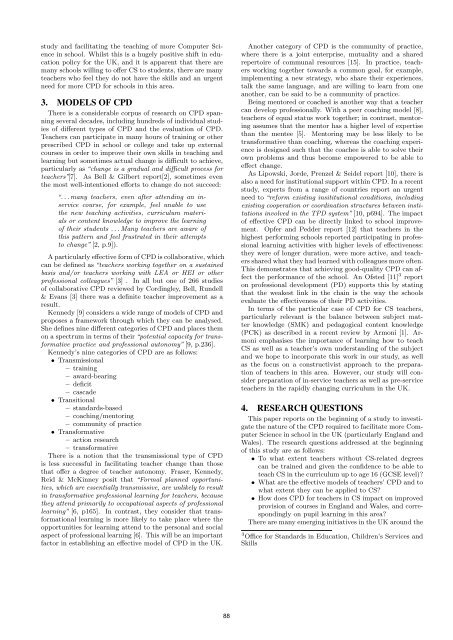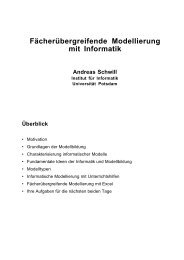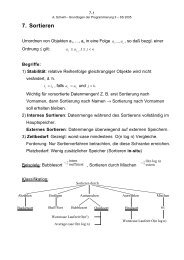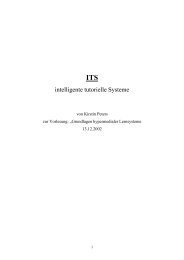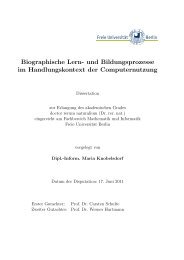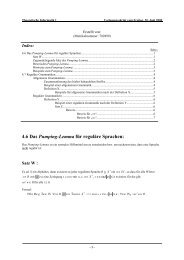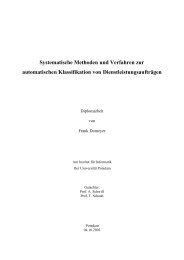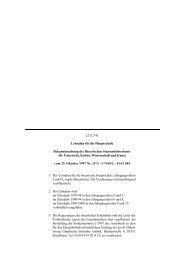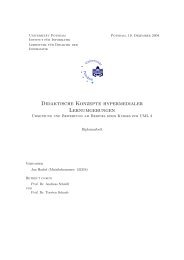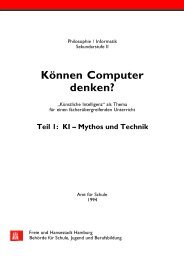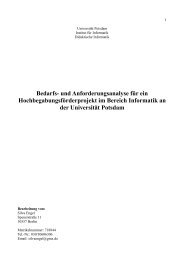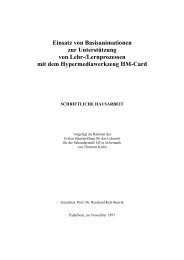Maria Knobelsdorf, University of Dortmund, Germany - Didaktik der ...
Maria Knobelsdorf, University of Dortmund, Germany - Didaktik der ...
Maria Knobelsdorf, University of Dortmund, Germany - Didaktik der ...
You also want an ePaper? Increase the reach of your titles
YUMPU automatically turns print PDFs into web optimized ePapers that Google loves.
study and facilitating the teaching <strong>of</strong> more Computer Science<br />
in school. Whilst this is a hugely positive shift in education<br />
policy for the UK, and it is apparent that there are<br />
many schools willing to <strong>of</strong>fer CS to students, there are many<br />
teachers who feel they do not have the skills and an urgent<br />
need for more CPD for schools in this area.<br />
3. MODELS OF CPD<br />
There is a consi<strong>der</strong>able corpus <strong>of</strong> research on CPD spanning<br />
several decades, including hundreds <strong>of</strong> individual studies<br />
<strong>of</strong> different types <strong>of</strong> CPD and the evaluation <strong>of</strong> CPD.<br />
Teachers can participate in many hours <strong>of</strong> training or other<br />
prescribed CPD in school or college and take up external<br />
courses in or<strong>der</strong> to improve their own skills in teaching and<br />
learning but sometimes actual change is difficult to achieve,<br />
particularly as “change is a gradual and difficult process for<br />
teachers”[7]. As Bell & Gilbert report[2], sometimes even<br />
the most well-intentioned efforts to change do not succeed:<br />
“. . . many teachers, even after attending an inservice<br />
course, for example, feel unable to use<br />
the new teaching activities, curriculum materials<br />
or content knowledge to improve the learning<br />
<strong>of</strong> their students . . . Many teachers are aware <strong>of</strong><br />
this pattern and feel frustrated in their attempts<br />
to change” [2, p.9]).<br />
A particularly effective form <strong>of</strong> CPD is collaborative, which<br />
can be defined as “teachers working together on a sustained<br />
basis and/or teachers working with LEA or HEI or other<br />
pr<strong>of</strong>essional colleagues” [3] . In all but one <strong>of</strong> 266 studies<br />
<strong>of</strong> collaborative CPD reviewed by Cordingley, Bell, Rundell<br />
& Evans [3] there was a definite teacher improvement as a<br />
result.<br />
Kennedy [9] consi<strong>der</strong>s a wide range <strong>of</strong> models <strong>of</strong> CPD and<br />
proposes a framework through which they can be analysed.<br />
She defines nine different categories <strong>of</strong> CPD and places them<br />
on a spectrum in terms <strong>of</strong> their “potential capacity for transformative<br />
practice and pr<strong>of</strong>essional autonomy” [9, p.236].<br />
Kennedy’s nine categories <strong>of</strong> CPD are as follows:<br />
• Transmissional<br />
– training<br />
– award-bearing<br />
– deficit<br />
– cascade<br />
• Transitional<br />
– standards-based<br />
– coaching/mentoring<br />
– community <strong>of</strong> practice<br />
• Transformative<br />
– action research<br />
– transformative<br />
There is a notion that the transmissional type <strong>of</strong> CPD<br />
is less successful in facilitating teacher change than those<br />
that <strong>of</strong>fer a degree <strong>of</strong> teacher autonomy. Fraser, Kennedy,<br />
Reid & McKinney posit that “Formal planned opportunities,<br />
which are essentially transmissive, are unlikely to result<br />
in transformative pr<strong>of</strong>essional learning for teachers, because<br />
they attend primarily to occupational aspects <strong>of</strong> pr<strong>of</strong>essional<br />
learning” [6, p165]. In contrast, they consi<strong>der</strong> that transformational<br />
learning is more likely to take place where the<br />
opportunities for learning attend to the personal and social<br />
aspect <strong>of</strong> pr<strong>of</strong>essional learning [6]. This will be an important<br />
factor in establishing an effective model <strong>of</strong> CPD in the UK.<br />
88<br />
Another category <strong>of</strong> CPD is the community <strong>of</strong> practice,<br />
where there is a joint enterprise, mutuality and a shared<br />
repertoire <strong>of</strong> communal resources [15]. In practice, teachers<br />
working together towards a common goal, for example,<br />
implementing a new strategy, who share their experiences,<br />
talk the same language, and are willing to learn from one<br />
another, can be said to be a community <strong>of</strong> practice.<br />
Being mentored or coached is another way that a teacher<br />
can develop pr<strong>of</strong>essionally. With a peer coaching model [8],<br />
teachers <strong>of</strong> equal status work together; in contrast, mentoring<br />
assumes that the mentor has a higher level <strong>of</strong> expertise<br />
than the mentee [5]. Mentoring may be less likely to be<br />
transformative than coaching, whereas the coaching experience<br />
is designed such that the coachee is able to solve their<br />
own problems and thus become empowered to be able to<br />
effect change.<br />
As Lipowski, Jorde, Prenzel & Seidel report [10], there is<br />
also a need for institutional support within CPD. In a recent<br />
study, experts from a range <strong>of</strong> countries report an urgent<br />
need to “reform existing insititutional conditions, including<br />
existing cooperation or coordination structures between institutions<br />
involved in the TPD system” [10, p694]. The impact<br />
<strong>of</strong> effective CPD can be directly linked to school improvement.<br />
Opfer and Ped<strong>der</strong> report [12] that teachers in the<br />
highest performing schools reported participating in pr<strong>of</strong>essional<br />
learning activities with higher levels <strong>of</strong> effectiveness:<br />
they were <strong>of</strong> longer duration, were more active, and teachers<br />
shared what they had learned with colleagues more <strong>of</strong>ten.<br />
This demonstrates that achieving good-quality CPD can affect<br />
the performance <strong>of</strong> the school. An Ofsted [11] 3 report<br />
on pr<strong>of</strong>essional development (PD) supports this by stating<br />
that the weakest link in the chain is the way the schools<br />
evaluate the effectiveness <strong>of</strong> their PD activities.<br />
In terms <strong>of</strong> the particular case <strong>of</strong> CPD for CS teachers,<br />
particularly relevant is the balance between subject matter<br />
knowledge (SMK) and pedagogical content knowledge<br />
(PCK) as described in a recent review by Armoni [1]. Armoni<br />
emphasises the importance <strong>of</strong> learning how to teach<br />
CS as well as a teacher’s own un<strong>der</strong>standing <strong>of</strong> the subject<br />
and we hope to incorporate this work in our study, as well<br />
as the focus on a constructivist approach to the preparation<br />
<strong>of</strong> teachers in this area. However, our study will consi<strong>der</strong><br />
preparation <strong>of</strong> in-service teachers as well as pre-service<br />
teachers in the rapidly changing curriculum in the UK.<br />
4. RESEARCH QUESTIONS<br />
This paper reports on the beginning <strong>of</strong> a study to investigate<br />
the nature <strong>of</strong> the CPD required to facilitate more Computer<br />
Science in school in the UK (particularly England and<br />
Wales). The research questions addressed at the beginning<br />
<strong>of</strong> this study are as follows:<br />
• To what extent teachers without CS-related degrees<br />
can be trained and given the confidence to be able to<br />
teach CS in the curriculum up to age 16 (GCSE level)?<br />
• What are the effective models <strong>of</strong> teachers’ CPD and to<br />
what extent they can be applied to CS?<br />
• How does CPD for teachers in CS impact on improved<br />
provision <strong>of</strong> courses in England and Wales, and correspondingly<br />
on pupil learning in this area?<br />
There are many emerging initiatives in the UK around the<br />
3 Office for Standards in Education, Children’s Services and<br />
Skills


